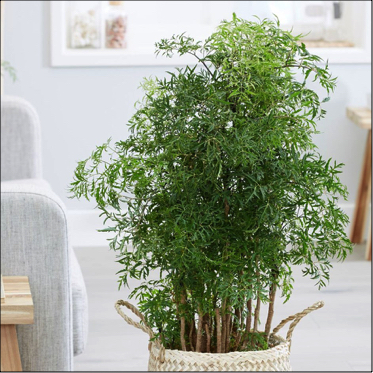
One afternoon I entered the room while John entertained a guest. My sudden appearance took him by surprise but rather than sending me away, he introduced us.
“Michael, this is Doug MacDougall.”
“Doug, this is Michael . . .” John said. Then he couldn't recall my last name. He gave me a look and blurted,
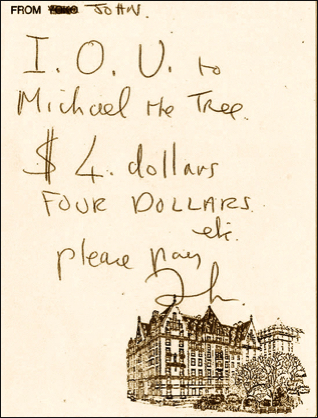
The next day, John told me Doug was a retired FBI agent hired to be Sean's bodyguard. He worried that his son could be the target of kidnappers. After that meeting, I used my new nickname, Michael Tree, as an alias for official Lennono business. I looked up the Japanese character for “tree” and discovered it had meanings of pure, and spiritual. But whenever I used it with Yoko, she always winced.
“Sit down and have some tea with me. I've finished with my househusband chores.”
As he put the kettle on the stove and opened packets of English breakfast teabags, he told me he'd been on the telephone earlier, talking to his Aunt. “Talking with her always leaves me with my shoulders up around my ears. Mimi has this idea that one day I'll come crawling back to her on my hands and knees, asking for a place to stay.”
He went to the refrigerator, retrieved a quart of milk, and put it on the table with the steaming cups of tea. “Did you ever want to play music when you were a kid?” he asked, sitting opposite me, leaving the power seat at the end of the table empty. “Your horoscope says you're supposed to be some kind of musical genius.”
“The banjo was the first instrument I learned. My mother taught me.”
“Your mother played the banjo!”
“Well . . . not really.” John talked about his early interest in American folk music and asked about my own. I told him I heard blues and folk music at a friend's apartments. He said he loved the music, too, but there was little in Liverpool during his youth.
“Have you ever heard of 'The Rock Island Line?'” he asked.
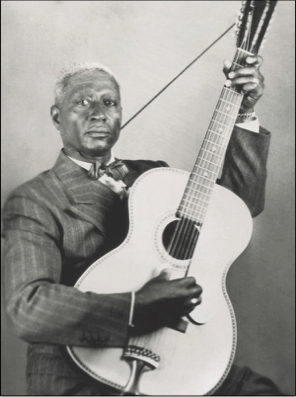
“Of course I have. It's by Lead Belly.”
“Lonnie Donegan recorded it in England when I was a teenager. All the kids formed skiffle bands. That's how I started the Quarrymen.”
His remark astonished me. John doesn't know how to read a horoscope. Who told him about my astrological influences? Did Yoko tell him or maybe Charlie?
“I've loved jazz and classical music since I was a kid. But that doesn't make me a genius. My parents were threatened by my interest in music, especially since there was no jazz and classical music at home.”
“Well, did you ever want to play music when you were a kid?”
“Yes, I did. When I was about twelve years old, I taught myself how to play the banjo. I heard Pete Seeger play it and got his book. But my parents discouraged me, and I gave it up after about a year.”
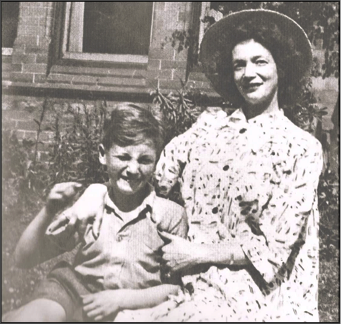
“Why don't you do it now? No one's stopping you.”
“I guess the time has passed. There's so much else to do.”
“Fuckin' hell—don't give me that shit! I thought you wanted to play!”
“When I started playing guitar, I used banjo chords my Mum taught me. I didn't know anything else. I would tune it any way that sounded good to me. I was playing the guitar that way when I met Paul. He said to me, 'Don't you know how to play that thing, mate?' Paul taught me all the guitar I know. I used to drive Mimi crazy with my practicing. She said I better do well in Art College because I'd never make a living with a guitar. When I bought her a house, I put a plaque on it quoting her: 'The guitar's all very well, John, but you'll never make a living at it.' ”
© Michael Barbosa Medeiros
© AP Images
“Pee poop adieu, I'm changing you,” John cooed. “Bebop a dee, you're changing me.” When he had finished changing his diapers, he handed his son to Helen Seaman, Sean's nanny, who had just entered the room. Then he invited me to join him at the kitchen table.
Enter Text
One afternoon, while I cared for the Ming tree in the bedroom, Yoko swept into the room, bounced onto the bed, and let out a giggle. Though in her forties, she had a girlish quality. A shy man, I smiled but said nothing. She didn't say anything either, and I left the room, flustered. A few days later she stopped me in the corridor and
asked me to get a Ming Aralia for the White Room. She told me I could buy any plants for the apartment that I wanted.
While searching at the plant market for the Ming tree, I found a beautiful eight-foot-high Ficus benjamina tree and bought it for the White Room. It looked like a specimen you'd see in a greenhouse. When the tree arrived at the Dakota, I put it in a white decorative container, added ferns to the base, and positioned it near the two corner windows, creating an island of green in the room. John moved an armchair next to the tree, often sitting under its spreading foliage, reading or gazing out the window.
“This is Michael Tree.” My Portuguese family name always got him confused.
Often, when I arrived at the apartment each morning, John would be at the kitchen table reading a newspaper, along with coffee and a cigarette. But one morning I found him
at the far end of the kitchen, bent over Sean, who lay on the couch.
At the time, I didn't understand his sudden outburst. But writing about that incident over thirty years later, I have an understanding of what happened. My unfulfilled yearning touched a chord in him. I think he also recognized that I denied my anger at my parents for rejecting my musical instincts. I think he also recognized that I denied my anger at my parents for rejecting my musical instincts. His sudden anger scared me but just as quickly, he beamed a warm smile.
The group played all of Donegan's songs [the Scotsman also played the banjo]. John, however, wanted to play Elvis's music, which was just filtering into England.
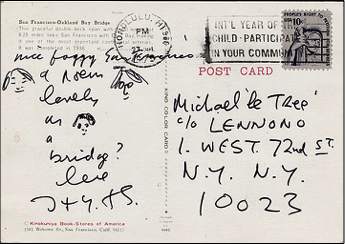
© Michael Barbosa Medeiros
All photos are used in a nonprofit, educational context with the claim of fair use.
This web site is copyright © 2020 by Michael Barbosa Medeiros.
All rights reserved.
MICHAEL TREE
Una tarde, mientras yo cuidaba del árbol Ming en el dormitorio, Yoko entró en la habitación, saltó sobre la cama y soltó una risita. Aunque tenía unos cuarenta años, tenía una conducta infantil. Como hombre tímido, sonreí, pero no dije nada. Ella tampoco dijo nada y salí aturdido de la habitación. Unos días después me detuvo en el pasillo y me pidió que consiguiera un Ming Aralia para la Sala Blanca. Me dijo que podía comprar las plantas que quisiera para el apartamento.
Mientras buscaba en el mercado de plantas el árbol Ming, encontré un hermoso árbol Ficus Benjamina de dos metros y medio de altura y lo compré para la Sala Blanca. Parecía un espécimen que verías en un invernadero. Cuando el árbol llegó al Dakota, lo puse en una maceta blanca, agregué helechos a la base y lo coloqué cerca de las dos ventanas de las esquinas, creando una isla verde en la habitación. John movió un sillón junto al árbol, y a menudo permanecía sentado bajo su extenso follaje, leyendo o mirando por la ventana.
Una tarde entré en la habitación mientras John entretenía a un invitado. Mi repentina aparición lo tomó por sorpresa, pero en lugar de despedirme, nos presentó.
"Michael, este es Doug MacDougall"
"Doug, este es Michael. . . " Dijo John. Entonces no pudo recordar mi apellido. Me dio una mirada y soltó:
“Este es Michael Tree” .
Mi nombre familiar portugués siempre lo confundía.
Al día siguiente, John me dijo que Doug era un agente retirado del FBI que iba a ser contratado para desempeñarse como guardaespaldas de Sean. Le preocupaba que su hijo pudiera ser el objetivo de secuestradores. Después de esa reunión, usé mi nuevo apodo, Michael Tree, como alias para el negocio oficial de Lennono. Busqué el carácter japonés de "árbol" y descubrí que tenía significados de pureza y espiritualidad. Pero cada vez que lo usaba con Yoko, ella siempre hacía una mueca.
Con frecuencia, cuando llegaba al apartamento todas las mañanas, John estaba en la mesa de la cocina leyendo un periódico, junto con un café y un cigarrillo. Pero una mañana lo encontré al fondo de la cocina, inclinado sobre Sean, que yacía en el sofá.
"Pee poop adieu, te estoy cambiando", susurró John. "Bebop a dee, me estás cambiando". Cuando terminó de cambiar sus pañales, le entregó su hijo a Helen Seaman, la niñera de Sean, que acababa de entrar en la habitación. Luego me invitó a unirme a él en la mesa de la cocina.
"Siéntate y tómate un té conmigo. Terminé con las tareas de mi amo de casa ".
John puso la tetera en la estufa y abrió paquetes de bolsitas de té inglés para el desayuno; mientras hablaba de una llamada telefónica que había tenido antes con su tía. “Hablar con ella siempre me deja con los hombros levantados alrededor de mis orejas. Mimi tiene la idea de que algún día volveré arrastrándome hacia ella sobre mis manos y rodillas, pidiéndole un lugar donde quedarme."
John sacó un litro de leche del refrigerador y lo puso sobre la mesa con las humeantes tazas de té. "¿Alguna vez quisiste tocar música cuando eras niño?" , me preguntó mientras se sentaba frente a mí, dejando vacío el asiento eléctrico al final de la mesa. "Tu horóscopo dice que se supone que eres una especie de genio musical".
Su comentario me dejo aturdido. John no sabe cómo leer un horóscopo. Quien le dijo sobre mis influencias astrológicas?. Lo hizo Yoko o tal vez Charlie?
“Me encanta el jazz y la música clásica desde que era niño. Pero eso no me convierte en un genio. Mis padres se sintieron amenazados por mi interés por la música, especialmente porque en casa no había jazz ni música clásica.”
"Bueno, ¿alguna vez quisiste tocar música cuando eras niño?"
"Sí, lo hice. Cuando tenía unos doce años, aprendí solo a tocar el banjo. Escuché a Pete Seeger tocarlo y conseguí su libro. Pero mis padres me desanimaron y lo dejé después de aproximadamente un año".
“¿Por qué no lo haces ahora? Nadie te detiene".
“Supongo que ha pasado el tiempo. Hay mucho más por hacer".
“! Maldita sea, no me vengas con esa mierda! ¡Pensé que querías tocar!
En ese momento, no entendí su repentina ira. Pero al escribir sobre este incidente más de treinta años después, puedo comprender algo de lo que sucedió. Mi anhelo insatisfecho debe haber tocado una fibra sensible en él. Creo que también reconoció que negué mi enojo con mis padres por rechazar mis instintos musicales. Su repentino arrebato me asustó. Pero con la misma rapidez, esbozó una cálida sonrisa.
"El banjo fue el primer instrumento que aprendí. Mi madre me enseñó".
"Tu madre tocaba el banjo!"
"Bueno . . . realmente no".
John habló sobre su temprano interés por la música folk estadounidense y me preguntó sobre el mío. Le dije que escuché blues y música folk en los apartamentos de un amigo. Dijo que también amaba la música, pero que había poca en Liverpool durante su juventud.
“Has escuchado alguna vez 'The Rock Island Line?'” , me preguntó.
"Por supuesto que lo tengo. Es por Lead Belly”.
“Lonnie Donegan lo grabó en Inglaterra cuando yo era adolescente. Todos los niños formaron bandas de skiffle. Así es como inicié los Quarrymen".
El grupo tocó todas las canciones de Donegan [el escocés también tocó el banjo]. John, sin embargo, quería tocar la música de Elvis, que se estaba filtrando a Inglaterra.
“Cuando comencé a tocar la guitarra, usaba los acordes de banjo que me enseñó mi mamá. No sabía nada más. La afinaba de cualquier manera que me pareciera bien. Estaba tocando la guitarra de esa forma cuando conocí a Paul. Me dijo: '¿No sabes cómo tocar esa cosa, amigo?' Paul me enseñó toda lo que conozco de guitarra. Solía volver loca a Mimi con mi práctica. Dijo que será mejor que me vaya bien en el Art College porque nunca me ganaría la vida con una guitarra. Cuando le compré una casa, le puse una placa que decía: "La guitarra está muy bien, John, pero nunca te ganarás la vida con ella".
Traducido por Carlos Larriega © 2021
❑
Leer en Español, desplácese abajo